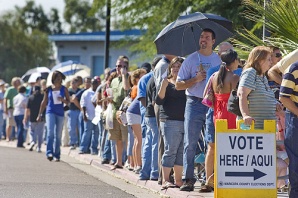
Online Voting can make long lines, and low turnout, obsolete.
Believe it or not, sometimes it’s not political.
While the greatest misconception regarding online voting is that we still don’t use it for elections in the U.S. because of technological barriers (a complete falsehood), another rapidly growing misconception is the suspicion that politics has denied us access to this technology. This is simply not true.
It is quite understandable to assume that pushback against election modernization is politically motivated. After all, we live in a time when voter I.D. is being used to suppress the vote. Several GOP Secretaries of State around the country have cut back on early voting, and closed polling places, in order to suppress turnout. Voter suppression in general is a very real, politically motivated thing today.
Archaic voting infrastructure itself is also a form of suppression. I made this point several years ago in my post, “The Great Suppressor”, highlighting how the inconvenience of the polling place makes it the most impactful suppressor of voter turnout. But unlike the other notable vote suppressors, the highly outdated state of our voting technology is not perpetuated by political parties seeking to lower turnout for the other side.
Our inability to modernize has been due to a variety of causes, led by an election administration and integrity culture that is resisting automation. Cheered on by this community, a small academic group of naysayers plays on the fears of the public regarding online hackers. American media pays little attention to the issue of modernization. When they do, they usually cater their treatment to the same public fears as the academic naysayers.
The high-tech companies, which provide modern online voting services, rarely enter public discussion, and just as rarely are contacted by reporters so that they can explain their industry. These companies need to form an association, which can become an easily identifiable entity for public relations about their industry.
Perhaps most importantly, both the media and the public have a warped view about voting convenience. We see long lines as an expression of patriotism. They aren’t. They are a sign of dysfunction. What we almost never see are all the voters who walk away from those lines and don’t vote. In 2012 in Florida, an estimated 200,000 voters intended to vote, but simply could not wait in line for up to 12 hours to do so.
In a country with such low average voter turnout rates, Americans should be embracing convenience, not praising inconvenience.
All of the above factors answer the question “Why don’t we vote online?”. None of them are politically induced in a traditional sense.
It might stand to reason that the GOP wouldn’t want voting to be more convenient for Democratic voters. But what about their own voters? In March the Utah GOP offered online voting as an option for their 2016 Presidential Caucus.
The Utah vote was historic, and the fact that it was a GOP election helps demonstrate that neither resistance to, or embrace of, modernization need be politically motivated.
Once voters experience online voting on a small scale for local voting or caucuses/primaries, they will demand the same ability for general elections.
Election dysfunction may not be politically caused, but it is very real nonetheless.
We must abandon our outdated election culture. We must end dysfunction.
We must Cyber The Vote.
